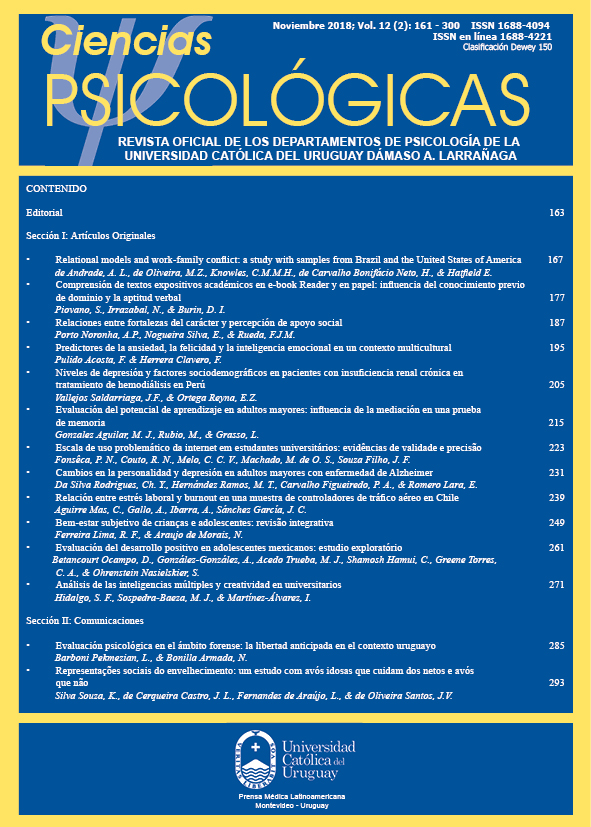Changes in personality and depression in older adults with Alzheimer’s disease
DOI:
https://doi.org/10.22235/cp.v12i2.1687Keywords:
mild cognitive impairment, neurocognitive disorder, personality, cognition, elderly, depression, Alzheimer’s diseaseAbstract
The literature refers that personality change begins in the premorbid phase of mild neurocognitive disorder (TNC) and that depression can increase these changes, on the other hand, depression is treatable and as such its influence on personality is reversible. In this sense it is urgent to understand what the effective influence of depression in the TNC is, in patients with Alzheimer’s. Objective: Explore level of depression and changes in personality in elderly with TNC due to Alzheimer’s disease. Methodology: A total of 437 older adults participated. Participants were evaluated through the application of a Personality Inventory NEO-FFI; Mini-Mental State Examination (MMSE), and the Beck Depression Inventory (BDI-II). Results: There was an increase in behavioural changes due to the influence of the responsibility trait, associated with the increase in cognitive symptoms, both due to the influence of depression.
Downloads
References
Beck, A. T., Ward, C. H., Mendelson, M., Mock, J., & Erbaugh, J. (1961). An inventory for measuring depression. Archives of General Psychiatry, 4, 561-571. doi:10.1001/archpsyc.1961.01710120031004
Cloninger C. R., Przybeck T. R., Svrakic D. M., & Wetzel R. D. (1994). The Temperament and Character Inventory (tci): A Guide to its Development and Use. Washington: Center for Psychology of Personality.
Costa, P. T., Terracciano, A., & McCrae, R. R. (2001). Gender diferences in personality traits across cultures. Robust and surprising fndings. Journal of Personality and Social Psychology, 81(2), 322-331. doi: 10.1037/0022-3514.81.2.322.
Costa, P. T., & Widiger, T. A. (Eds.). (2002). Personality disorders and the fve-factor model of personality (2nd ed.). Washington, DC: American Psychological Association.
Da Silva, C. Y. R. (2017). Envejecimiento – Evaluación e Intervención. México: Manual Moderno.
Da Silva, C. Y. & Carvalho, P. A. (2017a). Influencia de la depresión en cambios de personalidad del adulto mayor con enfermedad de Alzheimer incipiente. Enseñanza e Investigación en Psicología, 22(1), 103-109.
Da Silva, C. Y. & Carvalho, P. A. (2017b). Estado conductual y psiquiátrico en el adulto mayor con trastorno neurocognitivo leve de enfermedad de Alzheimer posible. Enseñanza e Investigación en Psicología, 22(3), 373-379.
Da Silva, C. Y., Carvalho, P. A., González, S. L. L., & Quino, H. J. M. (2018). Personalidad y estado psicológico en el trastorno neurocognitivo leve debido a enfermedad de Alzheimer posible. Revista Alternativas en Psicología, 39(1): 104 – 115.
Da Silva, C. Y., Carvalho, P. A., Quino, H. J. M., & Gruart, M. V. (2017). Effects of depression on cognition of patients with mild neurocognitive disorder due to possible Alzheimer’s disease. Ciencias psicológicas, 11(2): 149 – 154. doi: 10.22235/cp. v11i2.1486.
Da Silva, C. Y., Ramos, V. F., & Carvalho, P. A. (2018). Incremento de los cambios cognitivos en pacientes con enfermedad de Alzheimer inicial debido a depresión. Panamerican Journal of Neuropsychology, 12(1): 42 – 51. doi: 10.7714/CNPS/12.1.203.
Folstein, M. F., Folstein, S. E., & McHugh, P. R. (1975). Mini-Mental State: a practical method for grading the cognitive state of patients for clinician. Journal Psychiatric Reserch, 12: 189-198. doi.org/10.1016/0022-3956(75)90026-6.
Leyhe, T., Reynolds, C. F., Melcher, T., Linnemann, C, Klöppel, S., Blennow, K., Zetterberg, H. ... Hampel, H. (2017). A common challenge in older adults: Classification, overlap, and therapy of depression and dementia. The Journal of the Alzheimer’s Association, 13(1): 59-71. doi.org/10.1016/j.jalz.2016.08.007.
Pérez-Fuentes, M. C., Gázquez, J. J., & Morelo, M. M. (2012). Análisis de los “cinco grandes” factores de la personalidad en alumnos de la Universidad de mayores de Almería. European Journal of Investigation in Health Psychology and Education, 2(1), 19-28.
Pocnet, C., Rossier, J., Antonietti, J. P., Gunten A., & Phill, M. (2011). Personality Changes in Patients with Beginning Alzheimer Disease. La Revue canadienne de psychiatrie, 56(7): 408-417.
Qazi, A., Gutzmann, H., & Gul S. (2017) Depression and Anxiety in Dementia Subjects. In: Verdelho A., GonçalvesPereira M. (eds,) Neuropsychiatric Symptoms of Cognitive Impairment and Dementia. Neuropsychiatric Symptoms of Neurological Disease. Springer, Cham. doi: 10.1007/s00391-015-0898-8.
Ramakers, I. H. G. B., & Verhey F. R. J. (2017) The Difficult Distinction Between Affective Disorders and Mild Cognitive Deterioration. In: Verdelho A., Gonçalves-Pereira M. (eds.) Neuropsychiatric Symptoms of Cognitive Impairment and Dementia. Neuropsychiatric Symptoms of Neurological Disease. Springer, Cham.
Riddle, M., Potter, G. G., McQuoid, D. R., Steffens, D. C., Beyer, J. L., & Taylor W. D. (2017). Longitudinal Cognitive Outcomes of Clinical Phenotypes of Late-Life Depression. The American Journal of Geriatric Psychiatry, 25(10): 1123-1134. doi: 10.1016/j.jagp.
Rodrigues, C. (2015). Personalidad de Alzheimer – conducta y estado psicológico. España: Publicia.
Rodrigues, C., Castro, F. V., & Cruz Roja Española. (2014). Los cambios de personalidad en la enfermedad de Alzheimer. International Journal of Developmental and Educational Psychology, INFAD, 5(1): 177-186.
Rodrigues, C., Castro, F. V., & Figueiredo, P. (2014). Aspectos de la personalidad y personalidad premórbida en la enfermedad de Parkinson. International Journal of Developmental and Educational Psychology, INFAD, 5(1): 195-204.
Rodrigues, C., Castro, F. V., & Gruart, M. (2014a). Relación entre Cognición y Personalidad en Enfermos con Alzheimer. International Journal of Developmental and Educational Psychology, INFAD, 1(2): 187-196.
Rodrigues, C., Castro, F. V., & Gruart, M. (2014b). La Personalidad premórbida en la enfermedad de Alzheimer. International Journal of Developmental and Educational Psychology, INFAD, 1(2): 283-292.
Vidovich, M. & Almeida, O. P. (2011). Cognition-focused interventions for older adults: the state of play. Australasian Psychiatry 19(4): 313-316. doi: 10.3109/10398562.2011.579973.
Published
How to Cite
Issue
Section
License
Copyright (c) 2018 Universidad Católica del Uruguay

This work is licensed under a Creative Commons Attribution 4.0 International License.
















